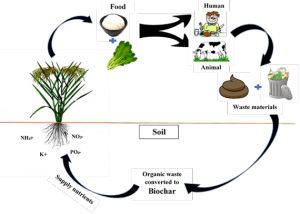Agricultural production will need to continue to increase to keep up with the projected population growth. At the same time, agricultural expansion and intensification are often associated with environmental damages such as land, nutrient and ground water pollution. This environmental degradation can have both direct and indirect negative impacts on agricultural productivity as well as human and ecological health. Because of that, it is important to have a structured of sustainable circulative agricultural system for the production of food and the utilization of biomass resources. In Agricultural Bio-system Engineering Laboratory, we will contribute to the establishment of sustainable and low carbon society based on agricultural production.
Projects
- Development of energy-saving carbonization technology
- Biochar for establishing environment-friendly crop production system.
- Development of cleaner bio-solid fuel production and combustion technology
- Research on analysis and application of transport phenomena of “biogas” and “methane fermentation digestive juice” utilizing microscale mechanical engineering
- Organic fertilizer production and biological deodorization by composting waste biomass
Development of energy-saving carbonization technology
Carbonization is a technology that pyrolyzes biomass at 350 ° C or higher and converts it into biochar with a high carbon content. On the other hand, many fossil fuels will be used in the pyrolysis and the drying process that precedes it. Therefore, the current situation is that high-moisture materials such as livestock excrement are not actively carbonized or even dried.
In order to change this situation, our laboratory aimed to carbonize biomass in an aerobic atmosphere in a temperature range (90 ° C) much lower than conventional carbonization. As a result, it was confirmed that biomass decomposes similar to the carbonization process even at low temperatures, and finally succeeded in improving the quality to a substance similar to peat (Itoh et al., PLoS ONE, 2018).
We are also aiming to develop a carbonization technology (self-heating carbonization method) that utilizes the self-heating reaction of waste biomass (Itoh et al., Waste Management, 2019). Currently, we are investigating the reaction conditions that cause the self-heating of biomass and the physicochemical properties of the biochar produced (Itoh et al., Plos ONE, 2020). In this method, the heat source required for carbonization is extracted from the inside of the raw material, so it is thought that biochar can be produced without using fossil fuels. In this way, the self-heating carbonization method is being researched with the expectation that it will be an epoch-making technology that will significantly change the conventional concept of carbonization.
【References】
- Itoh, T., Iwabuchi, K., Maemoku, N., Chen, S., Taniguro., K.
Role of ambient pressure in self-heating torrefaction of dairy cattle manure, PLoS ONE, 15, e0233027, 2020.
DOI: 10.1371/journal.pone.0233027 <OPEN ACCESS> - Itoh, T., Iwabuchi, K., Maemoku, N., Sasaki, I., Taniguro, K
A new torrefaction system employing spontaneous self-heating of livestock manure under elevated pressure, Waste Management, 85, 66–72, 2019.
DOI: 10.1016/j.wasman.2018.12.018 <OPEN ACCESS> - Itoh, T., Iwabuchi, K., Ota, K.
A new approach to stabilize waste biomass for valorization using an oxidative process at 90 °C, PLoS ONE, 13(4), e0196249, 2018.
DOI: 10.1371/journal.pone.0196249 <OPEN ACCESS>
Biochar for establishing environment-friendly crop production system.

For many years chemical fertilizers are conventionally used to increase agricultural crop production. However, there are concerns about the limited ore stocks, excessive fossil fuel utilization during the fertilizer manufacturing process, and the environmental impact of these fertilizer applications. Therefore, it is essential to switch from costly and energy-intensive crop production to environment-friendly sustainable agriculture.
To achieve a sustainable crop production system, it is crucial to recycling of nutrients through organic fertilizers such as manure and compost. Organic fertilizers are high-quality fertilizers that human beings have used for a long time, but they have problems such as short residence time in soil and low fertilizer efficacy compared to chemical fertilizers. Therefore, in our laboratory, we are proceeding with research intended to produce sufficient crops without chemical fertilizers by sole or combined application of biochar with compost.
【References】
- Piash, M. I., Iwabuchi, K., Itoh, T., Uemura, K.
Release of essential plant nutrients from manure- and wood-based biochars
Geoderma, 397, 115100, 2021.
DOI: 10.1016/j.geoderma.2021.115100 <OPEN ACCESS> - Ochiai, S., Iwabuchi, K., Itoh, T., Watanabe, T., Osaki, M., Taniguro, K.
Effects of Different Feedstock Type and Carbonization Temperature of Biochar on Oat Growth and Nitrogen Uptake in Coapplication with Compost, Journal of Soil Science and Plant Nutrition, 21, 276−285, 2021
DOI: 10.1007/s42729-020-00359-y
Development of cleaner bio-solid fuel production and combustion technology
The method of directly burning biomass to obtain heat energy is a technology that human beings have used for a long time, and is the most basic method of using bioenergy. However, when low-quality biomass is burned in a stove with low combustion efficiency, air pollutants such as PM2.5 are generated, and the annual death toll related to this has reached 4.2 million (2015). In order to improve such situation, this research aims to manufacture bio-solid fuel with low PM2.5 emission risk during combustion and to develop combustion technology.
【References】
- Itoh, T., Fujiwara, N., Iwabuchi, K., Narita, T., Mendbayar, D., Kamide, M., Niwa, S., Matsumi, Y.
Effects of pyrolysis temperature and feedstock type on particulate matter emission characteristics during biochar combustion, Fuel Processing Technology, 204, 106408, 2020.
DOI: 10.1016/j.fuproc.2020.106408 <OPEN ACCESS>
